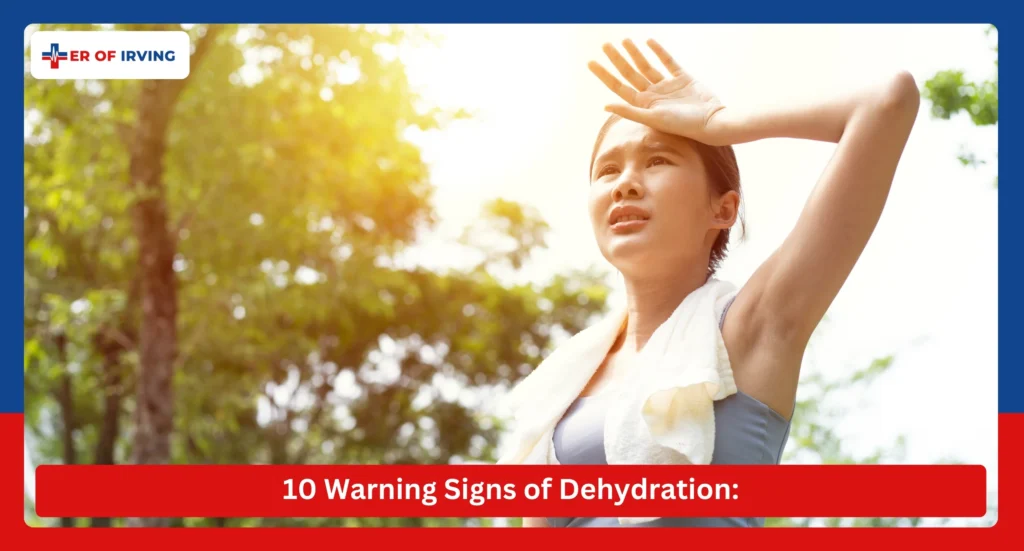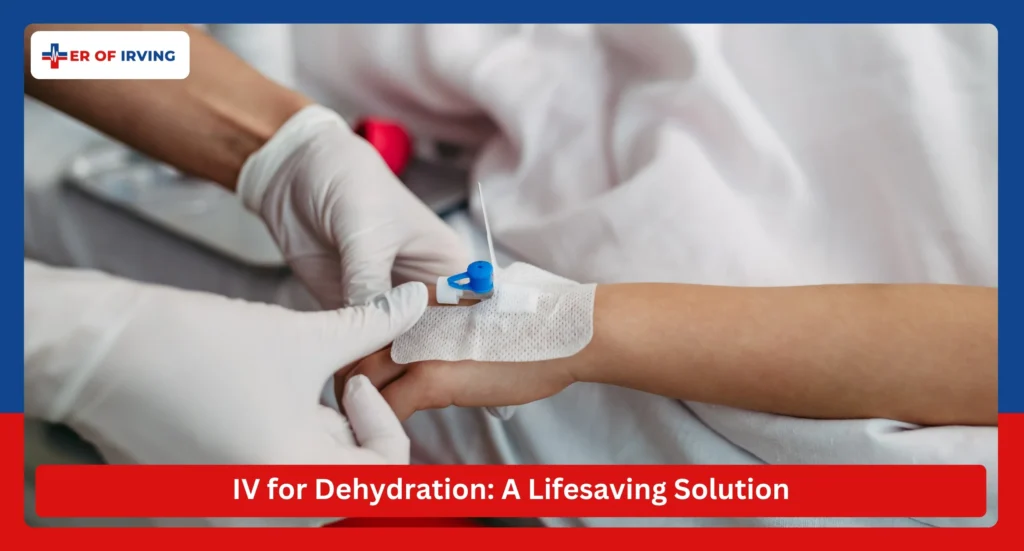Dehydration is a common yet often underestimated health concern that can affect people of all ages, especially during hot weather, intense physical activity, or illness. It occurs when your body loses more fluids than it takes in, disrupting normal functions and potentially leading to serious complications if ignored. Understanding the signs of dehydration is the first step toward prevention and timely intervention
In this guide, we’ll explore the early and extreme signs of dehydration, its causes, prevention, when it becomes a danger, and how dehydration is medically addressed.
What Is Dehydration?
Dehydration occurs when your body loses more fluids than it takes in, disrupting the balance of water and electrolytes that are vital for normal functioning. Even mild dehydration can lead to symptoms like fatigue and dizziness, while severe dehydration can cause serious complications affecting your heart, kidneys, and brain.
10 Warning Signs of Dehydration:

As dehydration advances, the body’s distress signals become more evident and harder to overlook. Here are 10 critical signs that indicate a need for immediate attention:
1. Excessive Thirst
A natural and early sign that your body is trying to correct fluid loss. This sensation arises when your brain detects a rise in blood sodium levels or a drop in blood volume, prompting you to drink. Ignoring this urge can lead to more severe symptoms, so it’s a critical cue to reach for water or an electrolyte drink. Thirst can intensify quickly in hot weather or during physical activity, making it essential to stay proactive.
2. Dry Mouth and Chapped Lips
Saliva production decreases when dehydrated, causing dry mouth and cracked, peeling lips. This happens because your body conserves water for vital organs, leaving your mouth and lips parched. You might also notice a sticky feeling or difficulty swallowing, which can worsen if exposed to dry or windy conditions. Applying a hydrating lip balm and sipping water can offer temporary relief, but persistent dryness warrants attention.
3. Dark Yellow Urine
Urine color is one of the easiest hydration indicators. The darker it is, the more dehydrated you likely are, as concentrated waste products give it a deep yellow or amber hue. This occurs when your kidneys conserve water, reducing urine output and intensifying its color. Checking your urine regularly—aiming for a pale straw color—can help you gauge your hydration status throughout the day.
4. Reduced Urination
Less frequent urination or very small amounts can signal dehydration. Going for 8 hours or more without urinating is a red flag, indicating your body is retaining water to protect essential functions. This is especially common during illness, heat exposure, or after excessive sweating. If you notice this pattern, increase fluid intake gradually and monitor for other symptoms to avoid escalation.
5. Fatigue and Weakness
With less fluid, your muscles and organs work harder, leading to tiredness and low energy. Dehydration reduces blood volume, making it tougher for oxygen and nutrients to reach your cells, which can leave you feeling sluggish. This effect is more pronounced after exercise or a long day, so rest and rehydration are key to restoring your strength. Chronic fatigue from dehydration may also signal an underlying issue needing evaluation.
6. Dizziness or Lightheadedness
Often occurs when blood volume drops, reducing oxygen flow to the brain. This can make you feel unsteady or faint, especially when standing up quickly, due to lower blood pressure. It’s a common sign during heatwaves or after prolonged fluid loss, and it may worsen if you skip meals alongside hydration. Sitting down and sipping water can help, but persistent dizziness requires urgent attention.
7. Muscle Cramps or Spasms
Fluid and electrolyte imbalances can cause involuntary muscle contractions, especially after exercise or heat exposure. This happens when sodium, potassium, and magnesium levels drop, affecting nerve signals to your muscles. Stretching gently and rehydrating with an electrolyte-rich drink can ease the discomfort. If cramps persist or spread, it may indicate severe dehydration and require professional care.
8. Dry, Flaky Skin
Skin becomes less elastic and loses moisture. If your skin stays ‘tented’ when pinched, you may be dehydrated, as it struggles to retain water under the surface. This can be more noticeable on your hands or face, especially in dry climates or after sun exposure. Moisturizing creams can help temporarily, but addressing the root cause with increased water intake is essential for recovery.
9. Rapid Heartbeat or Breathing
The heart compensates for decreased fluid volume by working faster, which can lead to palpitations or shortness of breath. This occurs as your body tries to maintain circulation with less blood plasma, putting extra strain on your cardiovascular system. It’s a serious sign, often accompanied by other symptoms like dizziness, and may escalate in extreme heat or illness. Rest and hydration are critical, followed by medical assessment if it continues.
10. Confusion or Irritability
Dehydration can impair brain function. This is especially dangerous for children and older adults, who may not recognize or communicate symptoms, leading to disorientation or mood swings. The brain relies on proper hydration to maintain focus and emotional balance, and a deficit can mimic signs of stress or fatigue. If someone shows these signs, especially with other symptoms, seek emergency evaluation immediately.
What Happens If You Are Dehydrated?

Ignoring dehydration can lead to a cascade of health problems, ranging from mild discomfort to severe medical emergencies. Here’s what can happen if dehydration persists:
● Electrolyte Imbalance:
Losing fluids disrupts the balance of essential minerals like sodium, potassium, and magnesium, affecting heart rhythm and muscle function.
● Heat Exhaustion or Heat Stroke:
In hot climates, dehydration exacerbates heat-related illnesses, with heat stroke being a life-threatening condition marked by a body temperature above 104°F (40°C).
● Kidney Strain:
Insufficient fluid intake forces the kidneys to work harder, potentially leading to kidney stones or acute kidney injury over time.
● Shock:
In extreme cases, severe dehydration can cause hypovolemic shock, where blood pressure drops dangerously low due to inadequate fluid volume.
The progression from mild to severe dehydration can happen quickly, particularly in vulnerable groups like children, the elderly, or those with chronic illnesses.
How Is Dehydration Evaluated?
If you’re experiencing symptoms of moderate to severe dehydration, medical professionals may perform:
- Vital signs check (blood pressure, heart rate)
- Physical exam (skin turgor, tongue moisture)
- Urinalysis to check for concentration and ketones
- Blood tests to evaluate electrolyte levels, kidney function, and fluid balance
In certain cases, IV fluids may be administered to restore hydration and balance quickly.
Prevention Tips: How to Stay Hydrated
Here are smart ways to prevent dehydration daily:
- Drink water consistently, even if you’re not thirsty
- Use electrolyte drinks during intense activity or illness
- Eat hydrating foods like cucumbers, melons, celery, and oranges
- Avoid excess caffeine and alcohol
- Dress lightly and rest in the shade during heat exposure
IV for Dehydration: A Lifesaving Solution

When oral rehydration isn’t sufficient, intravenous (IV) therapy becomes a critical intervention. This method delivers fluids and electrolytes directly into the bloodstream, offering rapid relief. Situations where IV for dehydration is necessary include:
- Extreme Dehydration: Caused by prolonged vomiting, diarrhea, or heat exposure.
- Inability to Drink: When swallowing is impaired due to nausea or unconsciousness.
- Severe Symptoms: Dizziness, rapid heartbeat, or confusion that signal advanced dehydration.
IV therapy is typically administered in emergency settings, providing immediate stabilization and a foundation for recovery, with follow-up care coordinated through specialists.
When to Seek Help: Emergency Care for Dehydration
If dehydration symptoms escalate, such as confusion, rapid heartbeat, or inability to keep fluids down, immediate action is vital. At ER of Irving, we offer 24/7 emergency evaluation, initial stabilization, and IV hydration to address severe cases. Our team provides diagnostic services and coordinates with specialists for ongoing care, ensuring you receive the support you need.
FAQs About Dehydration
Does dehydration give you diarrhea?
Not directly, but diarrhea can lead to dehydration by causing rapid fluid and electrolyte loss. Persistent diarrhea warrants an emergency visit for IV hydration.
What happens if you are dehydrated?
Chronic dehydration can strain organs, cause heat stroke, or lead to shock. Severe cases require urgent care to prevent long-term damage.
Can dehydration cause fever?
Yes, a mild fever can develop as the body struggles to cool itself, often alongside other dehydration signs.
Early signs and symptoms of dehydration?
Thirst, dry mouth, dark urine, and fatigue are the first clues to act on.
